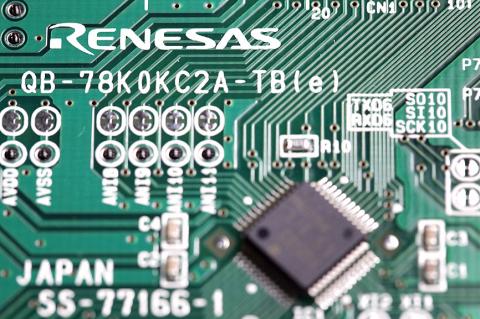The head of Japan’s Renesas Electronics said yesterday that the struggling chipmaker’s biggest shareholders have agreed to its request for financial aid, but declined to say how much they would kick in.
Renesas president Yasushi Akao told the firm’s annual shareholders meeting that he has asked and won agreement for help from technology giants NEC, Hitachi and Mitsubishi Electric, along with Renesas’s creditor banks.
BASIC AGREEMENT

Photo: Bloomberg
“The three top shareholders have expressed their basic agreement to our request for necessary capital. We are still discussing details and conditions,” Akao told the meeting held in Kawasaki City, near Tokyo.
His comments confirmed reports that its biggest investors, which own about 90 percent of its shares, would help the firm that was created by the merger of their own chip divisions over the past decade.
INJECTION
However, Akao declined to confirm Japanese media reports that Renesas, one of the world’s biggest chipmakers, would see a capital injection of about ¥100 billion (US$1.25 billion).
He also remained tight-lipped on a corporate overhaul that would reportedly see the loss of up to 14,000 jobs, or about one-third of its workforce.
NO MENTIONS
There was also no mention of a Nikkei business daily story over the weekend that said Renesas would issue roughly ¥50 billion in new shares to US investment firm Kohlberg Kravis Roberts.
Further details about the possible capital injection and any restructuring plan would be announced just ahead of the firm’s quarterly earnings next month, Akao said.
Last month, Renesas said it would boost the outsourcing of its chip production to Taiwan Semiconductor Manufacturing Co (台積電), including a bigger share of its output of microcontrollers — key components in vehicles and home appliances.
OVERSEAS SHIFT
Yesterday, Akao said Renesas has found it necessary to accelerate a shift of its manufacturing overseas and boost outsourcing in a bid to increase the firm’s competitiveness.
Renesas lost ¥62.6 billion in the year to March as Japan’s microchip sector struggles with a strong yen and fierce competition, especially from South Korean and Taiwanese rivals.

Greek tourism student Katerina quit within a month of starting work at a five-star hotel in Halkidiki, one of the country’s top destinations, because she said conditions were so dire. Beyond the bad pay, the 22-year-old said that her working and living conditions were “miserable and unacceptable.” Millions holiday in Greece every year, but its vital tourism industry is finding it harder and harder to recruit Greeks to look after them. “I was asked to work in any department of the hotel where there was a need, from service to cleaning,” said Katerina, a tourism and marketing student, who would

i Gasoline and diesel prices at fuel stations are this week to rise NT$0.1 per liter, as tensions in the Middle East pushed crude oil prices higher last week, CPC Corp, Taiwan (台灣中油) and Formosa Petrochemical Corp (台塑石化) said yesterday. International crude oil prices last week rose for the third consecutive week due to an escalating conflict between Israel and Iran, as the market is concerned that the situation in the Middle East might affect crude oil supply, CPC and Formosa said in separate statements. Front-month Brent crude oil futures — the international oil benchmark — rose 3.75 percent to settle at US$77.01

Merida Industry Co (美利達) has seen signs of recovery in the US and European markets this year, as customers are gradually depleting their inventories, the bicycle maker told shareholders yesterday. Given robust growth in new orders at its Taiwanese factory, coupled with its subsidiaries’ improving performance, Merida said it remains confident about the bicycle market’s prospects and expects steady growth in its core business this year. CAUTION ON CHINA However, the company must handle the Chinese market with great caution, as sales of road bikes there have declined significantly, affecting its revenue and profitability, Merida said in a statement, adding that it would

UNCERTAINTIES: The world’s biggest chip packager and tester is closely monitoring the US’ tariff policy before making any capacity adjustments, a company official said ASE Technology Holding Inc (日月光投控), the world’s biggest chip packager and tester, yesterday said it is cautiously evaluating new advanced packaging capacity expansion in the US in response to customers’ requests amid uncertainties about the US’ tariff policy. Compared with its semiconductor peers, ASE has been relatively prudent about building new capacity in the US. However, the company is adjusting its global manufacturing footprint expansion after US President Donald Trump announced “reciprocal” tariffs in April, and new import duties targeting semiconductors and other items that are vital to national security. ASE subsidiary Siliconware Precision Industries Co (SPIL, 矽品精密) is participating in Nvidia